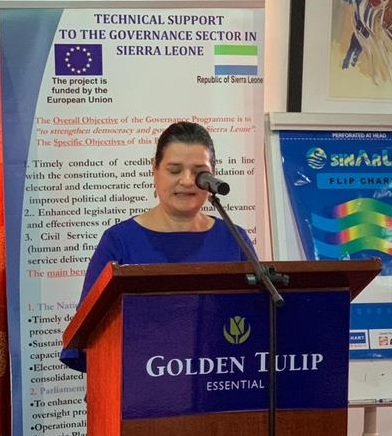Jamila AL ASSAIDI
EU Deputy Head of Delegation
Wednesday 1 October 2019
The NEC Commission by adopting new gender and disability policies has demonstrated an important commitment to the promotion of women’s and people with disabilities’ participation in electoral processes of Sierra Leone.
The EU was pleased to hear that following the successful launch of the NEC inclusion policies on 4 September, there has already been a positive dissemination drive with passionate feedback from Bo, Kenema, Makeni and Port Loko.
Today is an important opportunity to further drive the discussion in Freetown and to explore with all stakeholders present what should be the next steps to move forward the agenda of increasing women’s representation in decision-making and political affairs of Sierra Leone.
Gender Equality, Women’s Rights and People with Disabilities’ rights are at the very core of the EU values. The EU as a global actor promotes gender equality and women’s and girls’ rights not only within the EU but also worldwide, in all its actions across the world. In our political dialogue with the Government of Sierra Leone, along with other EU MS, we also systematically integrate gender, women and girls’ empowerment and inclusive governance as key issues to be discussed and followed up.
.
Ensuring women’s political rights is not just a moral imperative: history has shown that the inclusion of women in politics is one of the most effective means to ensure peace and to support conflict prevention.
The 2018 general elections’ observer reports clearly noted that women are underrepresented in elective positions. There should be significant improvements made by the Government and Parliament of Sierra Leone to promote women participation in upcoming elections and to establish suitable conditions and equal opportunities for people with disabilities to freely participate in electoral processes.
The EU would like to seize today’s opportunity to encourage the government and the Parliament of Sierra Leone to embark on the long awaited electoral legal reform process which provides unique opportunities to address the recommendations issued by the various 2018 elections observer groups in respect to gender and disability and to further ensure compliance with the international treaties and regional instruments that Sierra Leone is a state party to.
The EU hopes that gender and disability provisions will be included on the electoral reform agenda and that a platform will be established for coordination of gender related activities amongst stakeholders.
Needless to say: this electoral legal reform will require political ownership and the active engagement of all key actors to advance the reform process before upcoming elections.
The EU is ready to step in to provide the needed support through its technical assistance project currently embedded within the NEC.
The EU is also aiming at supporting the PPRC and APWA to train women in the political parties on active participation in political life, as well as the review of the Political Parties Act in view of entrenching participation of women in politics and elections.
